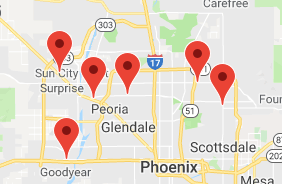To understand words it is necessary to hear all the speech sounds, transmit them to the brain, and decode the meaning. If anything disrupts this sequence it is likely that you will hear but not understand. The most common disruption is inability to hear certain sounds. It will appear that your hearing is fine but in reality you are missing critical sounds for understanding. Another common problem is loss of word discrimination in the brain. Proper amplification will maximize your ability to hear and understand in most situations.
Buying a hearing aid is different than buying tires for your car, a book from an online store or a new appliance for your home. Hearing loss affects each person in unique ways. Differences in the degree of the loss, lifestyle and personal preference mean that a hearing device that works great for one person, may not work for the next. An audiologist is trained to evaluate these differences for each person and help them select the best hearing device for their needs.
Therefore, the best place to get a hearing aid is from a local university-trained audiologist that you can meet with face to face. Purchasing a hearing device without the guidance and service of a professional can be risky, and is often a waste of money. Although the initial cost may be low, the products alone do not solve the problems faced by those with hearing loss..
The cost of aids can vary greatly depending on your hearing loss, your lifestyle and your insurance coverage. Your specific cost can’t be accurately determined until the audiologist has performed a hearing evaluation. Current hearing devices generally range from $1000-$3500 per ear.
Most of us are bombarded with ads for economical hearing aids. Businesses use cheap prices to draw people in, but often the provider is a salesperson with limited training and the devices are based on outdated technology.
Metro Hearing has been successfully treating hearing loss since 1980. Our providers are university-trained audiologists, not sales people. We do not just sell hearing aids, we are in the hearing care business.
You don’t have to sacrifice service and professionalism to get the best prices.
To know for sure what they will cost, it is necessary to see an audiologist for a consultation.
Hearing devices are able to compensate for damage to our ears and significantly improve our ability to hear speech, music, and environmental sounds. However, they do not repair the underlying damage that caused the hearing loss, and in most cases, there is nothing that can. While hearing devices will make a very noticeable improvement they will not restore your hearing to normal.
Both are licensed to dispense hearing aids, however there is a difference in the training required for each. The minimum educational requirements for hearing aid specialists is a high school diploma or GED. An audiologist is required to have a masters or doctoral degree from a university.
Free hearing tests are typically performed only to determine if the person can be sold a hearing aid and are not Medicare recognized diagnostic tests. Audiological hearing evaluations include a sequence of tests that can determine if there are any medical issues associated with the hearing loss. The more thorough the testing, the more optimal the solution will be.
In general, more expensive hearing aids have technology that allows them to help the patient hear speech more easily in noisy or difficult environments. More basic, less expensive aids do not have the technology that makes this possible. This technology is expensive to develop, so aids that have it will typically be more expensive. The lifestyle of the patient will be considered in our recommendation. If they spend time in noisy places regularly then a mid-level or high-end hearing aid will meet their needs best. If they are in quiet environments the majority of the time, then a more basic aid may be sufficient for them.
We have relationships with most hearing aid manufacturers. We recommend devices from an assortment of brands based on the needs of each patient. Some of the more common brands we work with are Oticon, Phonak, Resound, Siemens, and Widex.
Yes, almost all current hearing aids are digital. Digital means that the hearing aid has a computer that can automatically make adjustments for each environment that our patients encounter on a regular basis to make sure they are hearing as well as possible.
Audiology practices with university trained audiologists may be contracted with various medical insurance plans. The professionals at Metro Hearing are providers for the majority of these plans. Contact us and we can help you find out your particular benefit.
With Metro Hearing’s “Worry-Free” trial you will be able to see for yourself the difference a hearing device can make in your life. Your audiologist can make device recommendations by using information from your hearing evaluation and your lifestyle, but ultimately you will have the opportunity to choose for yourself.

